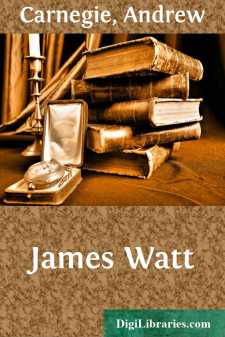Biography & Autobiography
- Adventurers & Explorers 15
- Artists, Architects, Photographers 16
- Business 2
- Composers & Musicians 14
- Criminals & Outlaws 5
- Editors, Journalists, Publishers 6
- Educators 1
- Entertainment & Performing Arts 3
- General
- Health, Exercise & Fitness 1
- Historians 3
- Historical 83
- Law Enforcement 1
- Lawyers & Judges 3
- Literary 147
- Medical 7
- Military 48
- Naturalists, Gardeners, Environmentalists 8
- Personal Memoirs & Diaries 226
- Philosophers 3
- Political 9
- Presidents & Heads of State 38
- Religious 38
- Rich & Famous 27
- Scientists 13
- Women 31
General Books
Sort by:
by:
Andrew Carnegie
CHAPTER I Childhood and Youth James Watt, born in Greenock, January 19, 1736, had the advantage, so highly prized in Scotland, of being of good kith and kin. He had indeed come from a good nest. His great-grandfather, a stern Covenanter, was killed at Bridge of Dee, September 12, 1644, in one of the battles which Graham of Claverhouse fought against the Scotch. He was a farmer in Aberdeenshire, and...
more...
by:
Suelette Dreyfus
Of course, it wasn't the first time The Parmaster craved a juicy piece of information. Both he and Force knew all about infatuation. That's how it worked with real hackers. They didn't just fancy a titbit here and there. Once they knew information about a particular system was available, that there was a hidden entrance, they chased it down relentlessly. So that was exactly what Par was...
more...
Some of Arnold's biographers have declared that he was a very vicious boy, and have chiefly illustrated this fact by painting him as a ruthless robber of birds'-nests. But a great many boys who began life by robbing birds'-nests have ended it much more creditably. The astonishing and interesting element in Benedict Arnold's career was what one might term the anomaly and incongruity...
more...
by:
Robert Southey
HORATIO, son of Edmund and Catherine Nelson, was born September 29, 1758, in the parsonage-house of Burnham Thorpe, a village in the county of Norfolk, of which his father was rector. His mother was a daughter of Dr. Suckling, prebendary of Westminster, whose grandmother was sister of Sir Robert Walpole, and this child was named after his godfather, the first Lord Walpole. Mrs. Nelson died in 1767,...
more...
by:
Lyndon Orr
Of all love stories that are known to human history, the love story of Antony and Cleopatra has been for nineteen centuries the most remarkable. It has tasked the resources of the plastic and the graphic arts. It has been made the theme of poets and of prose narrators. It has appeared and reappeared in a thousand forms, and it appeals as much to the imagination to-day as it did when Antony deserted his...
more...
"To the sea of fools Led the path of the children." Old Epigram. Just a word about the Crusades, or Holy Wars, before we begin our story. A war is generally a conflict between nations, countries, or individuals, for possession of land or a throne, but the Holy Wars were not such. They were expeditions made by those Christians who were determined to rescue the Sepulchre, or tomb, of Christ and...
more...
I.--Héloïse to Abélard Heloise has just seen a "consolatory" letter of Abelard's to a friend. She had no right to open it, but in justification of the liberty she took, she flatters herself that she may claim a privilege over everything which comes from that hand. "But how dear did my curiosity cost me! What disturbance did it occasion, and how surprised I was to find the whole...
more...
by:
Lyndon Orr
THE STORY OF ANTONY AND CLEOPATRA Of all love stories that are known to human history, the love story of Antony and Cleopatra has been for nineteen centuries the most remarkable. It has tasked the resources of the plastic and the graphic arts. It has been made the theme of poets and of prose narrators. It has appeared and reappeared in a thousand forms, and it appeals as much to the imagination to-day...
more...
by:
Victor Hugo
PREFACE. This volume of memoirs has a double character—historical and intimate. The life of a period, the XIX Century, is bound up in the life of a man, VICTOR HUGO. As we follow the events set forth we get the impression they made upon the mind of the extraordinary man who recounts them; and of all the personages he brings before us he himself is assuredly not the least interesting. In portraits...
more...
CHAPTER I. PERSONAL SKETCH OF GEORGE BIDDELL AIRY. The history of Airy's life, and especially the history of his life's work, is given in the chapters that follow. But it is felt that the present Memoir would be incomplete without a reference to those personal characteristics upon which the work of his life hinged and which can only be very faintly gathered from his Autobiography. He was of...
more...











